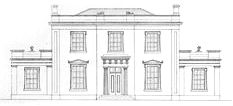Age
Lucy is described as being “not more than two or three and twenty.”
Family and Situation
Lucy Steele is the younger sister of Miss Anne Steele. As their home base appears to be in Exeter, we can that they are likely natives of Devonshire.
We never hear mention of the girls’ parents but instead they appear to spend time with friends and relatives across the country, including their uncle Mr. Pratt, who lives in Longstaple, Devonshire and relations (who may be the Richardsons) who live in London.
Mrs. Jennings seems to think that Mr. Steele is living but that both Steele and Pratt would probably try to kick in money when Edward and Lucy are inevitably trying to survive on a curate’s salary.
Connections
Is some kind of relation to Mrs. Jennings, though she doesn’t seem to know it until running into the sisters at Exeter around the holiday season. Later, we’re told ironically that Sir John encourages the Dashwoods to come meet the Steeles at Barton because “It was painful to him even to keep a third cousin to himself.”
Has a cousin in Bartlett’s Buildings, Holborn, London with whom she stays.
Appearance
We know that Lucy has lighter hair than Fanny Dashwood’s and likely about the same color as Elinor Dashwood’s, due the women’s misinterpretation of Edward’s ring.
Views of Lucy’s beauty appear to vary widely. The narrator tells us of the Steele girls that “their appearance was by no means ungenteel or unfashionable. Their dress was very smart.” Robert Ferrars says, after first glimpse, that he found her “the merest awkward country girl, without style, or elegance, and almost without beauty.” On the other hand, Sir John Middleton describes her as “monstrous pretty.” Elinor and Marianne find her to have “considerable beauty; her features were pretty, and she had a sharp quick eye, and a smartness of air, which though it did not give actual elegance or grace, gave distinction to her person.” Thomas, the servant at Barton Cottage, says that he always considered her “handsome.”
Character
At first glance, Lucy appears well-tuned to drawing room comportment and able to better her social position. Elinor observes that of the girls, “their manners were particularly civil, and Elinor soon allowed them credit for some kind of sense, when she saw with what constant and judicious attention they were making themselves agreeable to Lady Middleton,” though the narrator also says that “Elinor was not blinded by the beauty, or the shrewd look of the youngest, to her want of real elegance and artlessness.”
As the relationship deepens, it becomes clear that Lucy still bears traits from her lower class upbringing. Speaking from Elinor’s point-of-view, the narrator says that “Lucy was naturally clever; her remarks were often just and amusing; and as a companion for half an hour Elinor frequently found her agreeable; but her powers had received no aid from education: she was ignorant and illiterate; and her deficiency of all mental improvement, her want of information in the most common particulars, could not be concealed from Miss Dashwood, in spite of her constant endeavour to appear to advantage. Elinor saw, and pitied her for, the neglect of abilities which education might have rendered so respectable; but she saw, with less tenderness of feeling, the thorough want of delicacy, of rectitude, and integrity of mind, which her attentions, her assiduities, her flatteries at the Park betrayed; and she could have no lasting satisfaction in the company of a person who joined insincerity with ignorance; whose want of instruction prevented their meeting in conversation on terms of equality, and whose conduct toward others made every shew of attention and deference towards herself perfectly valueless.”
It becomes clear over time that Lucy is very much aware of her own status and shrewd about her own advancement. When she reveals the engagement to Elinor, it is clear that she has never met any of the Ferrarses except for Edward, but she knows all their names and that Mrs. Ferrars lives in Park Street, London. Later on, Mrs. Jennings says “she knows better than any body how to make the most of every thing; I dare say, if Mrs. Ferrars would only allow him five hundred a-year, she would make as good an appearance with it as any body else would with eight.”
In temperament, Lucy also appears to be lacking. She says of herself that “I am rather of a jealous temper...by nature.” Later on, she writes a very abrupt and insensitive letter to Edward to end their engagement after she has left him for his brother.
